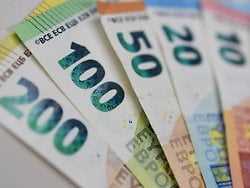Sunday, January 02, 2022
7,700,000,000,000 euros
Private households are as rich as never before
Worries about the job, canceled trips and closed shops: Even in the second year of the pandemic, Germans prefer to put their money aside. As a result, financial assets have again risen to a record level – but investment behavior is also changing.
Many people in Germany increased their wealth further in 2021. All in all, private households are as rich as never before, as DZ Bank has calculated. Accordingly, their financial assets are likely to have increased by more than seven percent to the record value of almost 7.7 trillion euros in the past year. Official figures from the Deutsche Bundesbank are expected in the spring. These evaluations take into account cash and bank deposits, securities such as stocks and funds, and claims against insurance companies.
According to the Socio-economic panel, a long-term study at the German Institute for Economics, however, the distribution of wealth is very uneven. According to this, the top ten percent of the country owns 55 percent of the wealth – the bottom 50 percent, on the other hand, only 1.5 percent. According to DIW, one reason for this is that there are relatively few owners of residential property in Germany and instead many tenants.
“The main driving force behind the accumulation of wealth was savings, although they were slightly lower, but again extremely high in historical comparison,” explained DZ bank economist Michael Stappel. He assumes that the savings rate in 2021 was again comparatively high at over 15 percent. For every 100 euros of disposable income, private households would then have put 15 euros on the high edge.
So the Germans continued to save like the world champions – even if the savings rate has fallen a little again. In the crisis year 2020, the rate jumped to a record 16.1 percent. Because of concerns about short-time working or unemployment as a result of the pandemic, many people had held back with purchases, trips were also canceled, and temporary closings in retail stores slowed consumption.
It was only in the summer of 2021 that the relaxation of the corona restrictions and the hope of getting the pandemic under control did the private savings rate noticeably decrease again. According to calculations by the Federal Statistical Office, it decreased to 10.7 percent in the third quarter and thus came close to the level of the pre-Corona period. “However, the consumption of private households was already clouded again in autumn when the fourth corona wave set in with full force and the newly emerged Omikron variant caused uncertainty,” writes Stappel in his analysis.
More citizens are investing in the stock market
Many households simply park money in their current account at such times. Because so often large sums of money without interest – or in the worst case even charged with penalty interest – lie around at the bank, the more risk-averse savers in Germany are increasingly daring to go to the stock market. “As the period of extremely low interest rates increased and there was no prospect of a noticeable rise in interest rates anytime soon, (…) more and more citizens reacted with an adjusted investment behavior,” summarizes the DZ Bank analysis. “Many were new to the securities business – especially young investors.” In the period from September 2019 to September 2021, for example, the number of securities accounts in Germany increased by 3.9 million to 27.1 million.
According to the industry association BVI, 2021 was likely to be the best sales year in its history for the fund industry in Germany: By the end of September alone, 167.9 billion euros flowed into funds. In the previous record year of 2015, it was 186.6 billion euros in twelve months. According to BVI figures, retail funds aimed at a broader group of investors had already exceeded the 2000 record in new business at EUR 85.9 billion at the end of September.
Price gains on the stock exchanges increased the value of stocks, funds and certificates – and thus, in total, the financial assets of private households. Stappel expects that this will also be the case in the new year: “The increase in financial assets will be somewhat weaker in 2022 than in the previous year due to a lower savings rate, but the upswing should support the price development on the stock exchanges and again lead to increases in the value of private financial assets contribute.”
